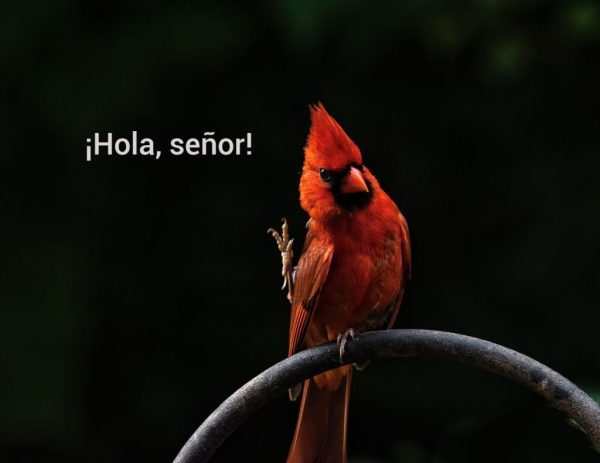
Unlock Communication Skills With These 10 Essential & Versatile Spanish Salutations

Unlock Communication Skills With These 10 Essential & Versatile Spanish Salutations
Learning the basics of Spanish – like“hello” in Spanish or any other greetings or introductions – is the best preparation you can do for a future trip to a Spanish-speaking country. Either that or maybe you need to get your basic Spanish on point for a first date (wink wink) or a business meeting where you want to make a good first impression. No matter the situation, you came to the right place!
Let’s break down the most important Spanish greetings and introductions you’ll need for a basic conversation in Spanish. As Speedy Gonzales used to say:¡Arriba, arriba! ¡Ándale, ándale! – meaning “Go, go! Come on, come on!”
“Hello” in Spanish: ¡Hola
¡Hola! – pronounced without the “h” – is your safety net wherever you’ll go: to a date, meeting or a Spanish-speaking country. This is the absolute basic greeting you need to know in Spanish and it can be used to salute any person regardless of the circumstance: formal or informal.
“Hola”, the cooler brother of “hello” – as I like to call it – is so short, sweet & simple you’ll simply love using it even as a part of your English greetings.

“Hello” by Pablo Gentile©
Pro tip: All you need is a simple “hola” to spark aconversation in Spanish with people from Spain, Mexico, Argentina or Colombia. They are generally very nice and chatty people and they will be extremely happy to find out you are trying to speak Spanish . From my experience, they will probably start talking to you right away with the speed of a Bugatti. Your safety net in this situation will certainly be_Yo no hablo Español_ –I don’t speak Spanish .
Bonus dating tip: “Hello, beautiful” in Spanish is “Hola, hermosa” and “Hello, handsome” in Spanish is “Hola, hermoso”. Good luck! (wink wink)
Spanish greetings for certain moments of the day
Buenos días – literally meaning “good days”, “buenos días” is more formal than “hola” and it translates to “good morning . The same as in English, this greeting can be used anytime before noon in both formal and informal contexts.
“Buenas tardes” translates to “good afternoon” and is typically used between noon and sunset. The same as “buenos días”, this greeting is slightly more formal than “hola”.
Buenas noches can mean both “good evening” and “good night” in Spanish.The Spanish language doesn’t have a dedicated word for “evening” so it uses “noche” to express both “evening” and “night”.
While in English, we use “good evening” to greet someone and “good night” to say goodbye to someone when it’s nighttime, the Spanish language uses “buenas noches” in both contexts.

¡Hola, señor! by Bruce Jastrow©
“How are you?” in Spanish
In many places around the world, you can also greet people by asking, “how are you?” or “what’s up?”. Particularly in informal situations.
Well, Spanish makes no exception. In fact, there are many ways you can ask someone“how are you” in Spanish . Here are a few of them:
¿Cómo estás? – literally meaning “how are you?”
¿Qué pasa? – is the equivalent of English “what’s up?” and it literally means “what’s happening?”
¿Qué onda? – generally used in Mexico; is the equivalent of English “what’s up?”
¿Qué tal? – it translates to “how are you?” in English and if you add “todo” at the end – ¿qué tal todo? – it expands its meaning to “how is it all going?”
¿Qué hay? – generally used in Spain; it is used the same way we use “hey!” or “what’s up” in English
¿Cómo va? – it translates to “how is it going?” and you can also add “todo” at the end – ¿cómo va todo? – to expand its meaning to “how is it all going?
“Yes”, “please” and “thank you” in Spanish
If you want to learn Spanish colors , “yes”, “no”, “please” and “thank you” together with the above-mentioned greetings are the absolute basics you’ll need to master before moving forward. Here’s how to say these basic but at the same time crucial Spanish words :
- Yes – Sí
- No – No
- Please – Por favor
- Thank you – Gracias
- You’re welcome – De nada
- I’m sorry – Lo siento
- I have/I don’t have – Tengo/No tengo
- Nice to meet you – Encantado/Encantada de conocerte
Goodbye in Spanish
At the end of your rendezvous, you will probably need to say “goodbye” so as to maintain the good first impression you managed to make with your flawless Spanish greetings and introductions. Let’s see how you can do that:
- Goodbye – Adiós
- Bye – Chau (the Spanish version of Italian Ciao)
- See you – Nos vemos
- See you in a minute – Hasta ahora
- See you later – Hasta luego
- See you soon – Hasta pronto
- See you tomorrow – Hasta mañana
- See you next week – Hasta la próxima semana
Or as The Terminator would say:Hasta la vista, baby!

Not sure you understand how Spanish accents work? Check out our article on how to master them all .
Speak Spanish fluently in just 10 minutes a day
Do you want to speak Spanish fluently fast? Get Mondly, the award-winning language learning app that will help you speak Spanish as if it were your first language.
It can be really tricky to master Spanish pronunciation if you don’t actively live in a Spanish-speaking country. But with Mondly you’ll have access to a unique, fast and highly efficient learning method that allows you to learn Spanish naturally with practical topics, authentic conversations and bite-sized Daily Lessons.
Start using Mondly for free on your computer or download the app and learn Spanish fast anytime, anywhere.
Also read:
- [New] Free Windows Programs Expertly Record Live Shows for 2024
- [New] Step Into a TikTok Realm A Guide for Joining Lives for 2024
- [New] Transform Your Device's Display Into a High-Quality Record
- [Updated] In 2024, Win 10'S Best Webcam Recording Software Guide
- A Decade: MondlyBack ButtonFilter Triumph
- Cultivating a Natural French Accent with Idioms
- Efficiency in Language Learning: Top 7 Afrikaans Strategies on Mondly
- Jumpstart Your 2023: Save Big & Gain Lifetime Access to Mondly Premium
- Say Hi in Another Language Today – At Nearly No Cost to You
- Shuttered by Darkness IPhone Tips & Tricks
- Solutions to open Excel 2003 Read Only Documents | Stellar
- Title: Unlock Communication Skills With These 10 Essential & Versatile Spanish Salutations
- Author: Christopher
- Created at : 2024-10-18 17:42:54
- Updated at : 2024-10-24 18:08:39
- Link: https://mondly-stories.techidaily.com/unlock-communication-skills-with-these-10-essential-and-versatile-spanish-salutations/
- License: This work is licensed under CC BY-NC-SA 4.0.